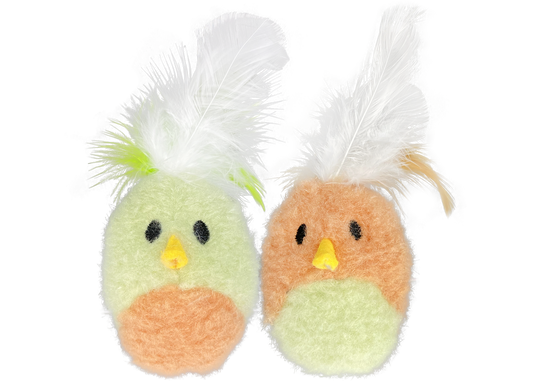Collection: Birds
-
Dog Bandana - Holiday Birds
Regular price $14.99 USDRegular price$13.99 USDSale price $14.99 USD -
Multipet Catnip Feather Bird (2pk)
Regular price $7.99 USDRegular price$11.99 USDSale price $7.99 USDSale -
KONG Crinkle Bird Catnip Cat Toy
Regular price $6.99 USDRegular price$10.99 USDSale price $6.99 USDSale -
Stella & Chewy's Wild Weenies Game Bird Treats (3.25oz)
Regular price $14.99 USDRegular price$20.99 USDSale price $14.99 USDSale -
KONG Comfort Jumbo Bird X-Large Plush Dog Toy
Regular price $14.99 USDRegular price$21.99 USDSale price $14.99 USDSale -
KONG Cruncheez Stretch Bird XL Durable Plush Dog Toy
Regular price $18.99 USDRegular price$27.99 USDSale price $18.99 USDSale -
Fromm 4 Star Adult Grain-Free Game Bird Dry Cat Food
Regular price From $25.99 USDRegular price$37.99 USDSale price From $25.99 USDSale -
Flapping Bird Cat Toy – Interactive Catnip Plush
Regular price $35.25 USDRegular price$47.99 USDSale price $35.25 USDSale -
Funny Feather Bird With Bell Cat Stick Toy For Kitten Play
Regular price $3.00 USDRegular price$4.99 USDSale price $3.00 USDSale -
Funny Feather Bird With Bell Cat Stick Toy For Kitten Play
Regular price From $14.00 USDRegular price$15.99 USDSale price From $14.00 USDSale -
Bird Toy Wild Harvest Chew and Jingle Bells
Regular price $9.99 USDRegular price$14.99 USDSale price $9.99 USDSale -
-
Pride Paloma Bird Dog Rope Plush Toy 5.5 Polyester Material
Regular price $4.25 USDRegular price$6.99 USDSale price $4.25 USDSale -
Morris Bird Double-SIded Pet Bandana
Regular price $8.00 USDRegular price$7.99 USDSale price $8.00 USD -
Morris Bird Round Neck Shirt
Regular price From $17.00 USDRegular price$15.99 USDSale price From $17.00 USD -
Morris Bird Tank Top
Regular price From $18.00 USDRegular price$16.99 USDSale price From $18.00 USD




























